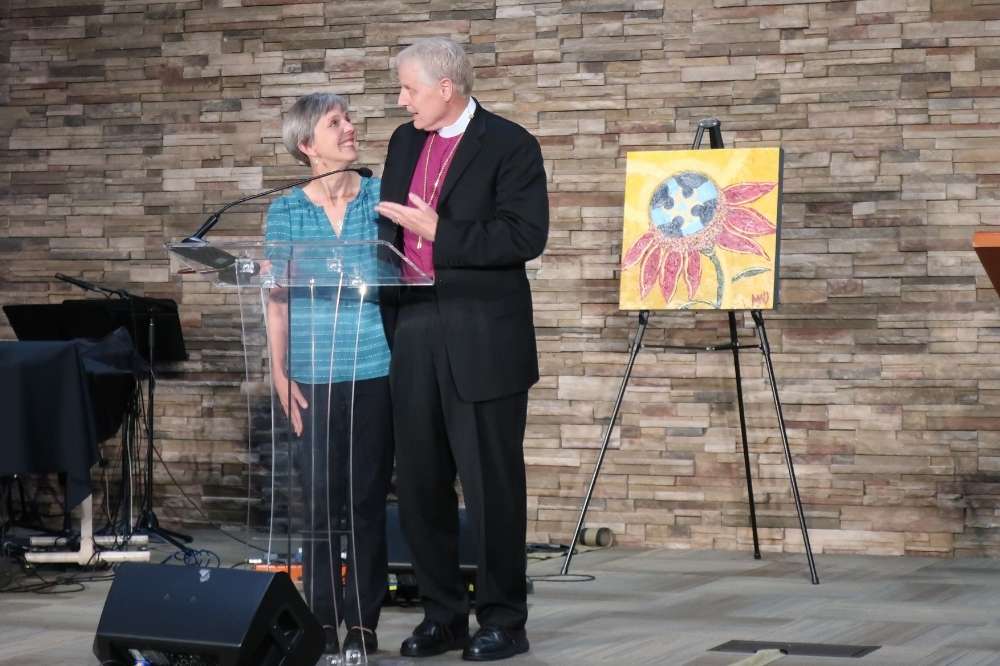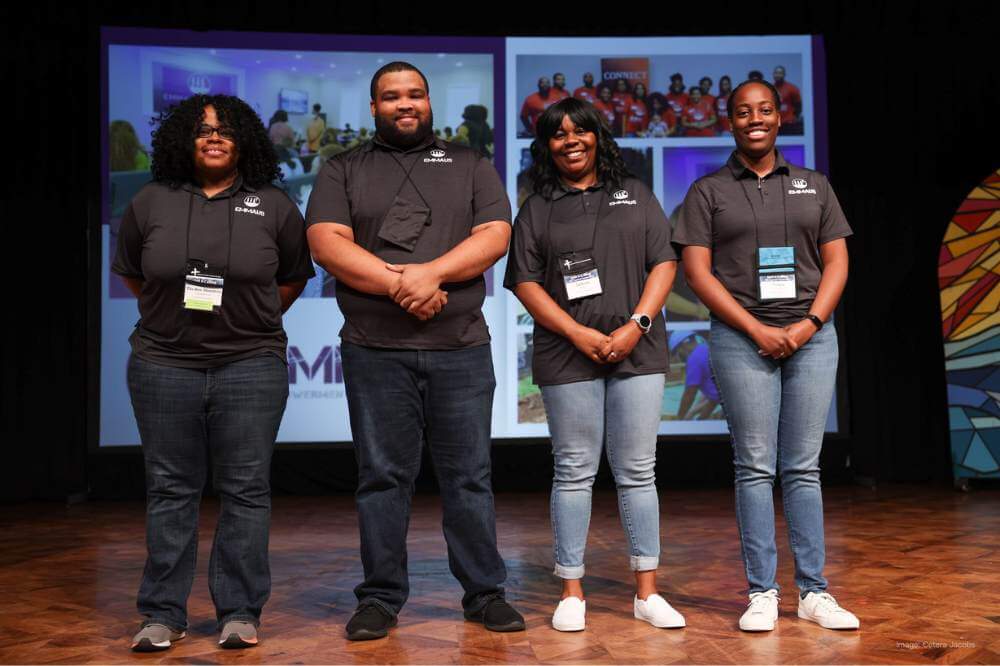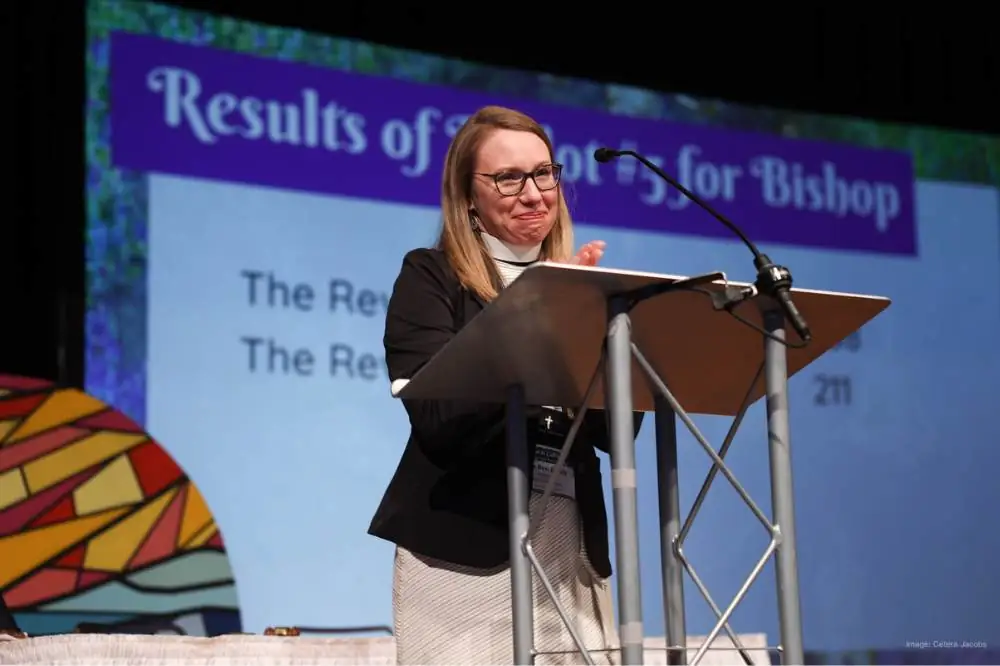Each ELCA synod holds a bishop’s election every six years. In 2015, Rev. Timothy Marcus Smith was elected to the office of Bishop of the North Carolina Synod of the ELCA, and he has served faithfully for nearly six years. This means a bishop’s election was a point of business at the 2021 synod assembly.
At the outset, Bill Horne, Vice President of the ELCA Church Council, addressed the assembly about the process for the election of a bishop. He reminded those gathered that this is not only an election with votes and ballots but a time of discernment, a moment to listen closely to the Spirit’s guidance. Vice President Horne described the ways a bishop is a pastor, a servant, a symbol of our unity, the chief ecumenical officer in the synod, and CEO of the synod.
Vice President Horne called us to pray for our bishop and the work of the Spirit and continued in presiding over the bishop’s election by explaining how each ballot works.
1st ballot—Voting members may write in any person serving on the ELCA roster of Word and Sacrament. 75% of valid votes are required for an election on the first ballot. If there is no election, then the assembly moves on to the second ballot.
2nd ballot—Nominees who do not wish to be on the ballot going forward withdraw their names. Votes are cast for the remaining nominees. 75% of valid votes are required for an election on the second ballot. If there is no election, then the assembly moves on to the third ballot.
3rd ballot—The seven nominees who have received the most votes (plus any ties for 7th place) are on the third ballot. Each nominee will address the assembly and a background check is done on each nominee moving forward in the election. 66% of valid votes are required for an election on the third ballot. If there is no election, then the assembly moves on to the fourth ballot.
4th ballot—The three nominees who have received the most votes (plus any ties for 3rd place) are on the fourth ballot. 60% of valid votes are required for an election on the fourth ballot. If there is no election, then the assembly moves on to the fifth ballot.
5th ballot—The two nominees who have received the most votes are on the fifth ballot. A majority of valid votes are required for election.
The Rev. Jasmine Tesdahl (Holy Trinity, Hickory), chair of the Bishop’s Election Committee gave instructions for voting using Zoom Polls and Google Forms, and Greg Hudgins invoked the Holy Spirit prior to the first ballot, praying “Lead this assembly to one heart and one mind in you.”
After the votes were cast, the assembly had a scheduled break. Phil Tonnesen brought us back from our break and opened the second session with a prayer of thanksgiving for those who have made the assembly possible.
Vice President Horne stepped to the mic to read the results of the first ballot. 357 valid votes were cast, making 268 votes necessary for a candidate to meet the 75% required for an election. He read the names of everyone who received a vote. Many received one vote, several received two votes, a few received 4, 6, or 8 votes. The Rev. CeCee Mills, the synod’s Associate Director for Evangelical Mission, received 11 votes, and the person with the next most votes was Bishop Tim Smith with 289 votes (81%). Vice-president Horne declared Timothy Smith elected.
Bishop-elect Smith addressed the assembly, first inviting his wife, Wendy, to join him. Thanking Wendy for her partnership and support as they have moved through life together, he then turned to the assembly and said, “Thank you for the confidence that you place in me and the Holy Spirit for our moving together into the future.”
Because Bishop Tim was re-elected on the first ballot, several steps of the full election process were not needed. One of the most important pieces of the election process is prior to the third ballot when the top candidates address the assembly and answer questions crafted by the elections committee. Since this step was not used for Bishop Tim’s election, those questions were posed to him in a session affectionately called “Bishop in the Hot Seat.” Without seeing the questions ahead of time, he answered extemporaneously.
The Rev. Jasmine Tesdahl posed several questions. Here are a few highlights.
Q: What does your commitment to antiracism look like in your daily life, and how will you continue to lead predominantly white congregations, so that BIPOC people will not be harmed?
A: It’s a real journey. A part of that has been something I shared in the past election, growing and learning that I have more work to do with my own privilege. Personal discovery and confession are a part of my journey. Sharing that with people in a hopefully disarming way: “I know that I have privilege, so let’s talk.” Reading books about racism, being a part of our synod’s Racial Justice Network as a member, not a leader, and lots of discussion. But, mostly the personal habits and language we don’t even know are racist because privilege by its nature doesn’t know that it’s there. It blinds us. I am very much committed. Sometimes, it’s hard to know if I go to Elizabeth City (and march) because I’m bishop or because I’m Tim. That answer is yes.
Q: How would you respond to the statement, “My pastor/bishop is too political?”
A: We are all political all the time. Our synod assembly is political. We just had an election. Politics is how we live together in relationship. It’s how we structure our lives. The important part of this is that isn’t partisan. It doesn’t begin in politics. It begins in the gospel of Jesus Christ, and then connecting of dots politically becomes a lot easier. (…) There is not a place in the world where politics does not exist, including a pulpit.
Q: What is the biggest challenge in moving the body of Christ forward in such a politically charged climate in the U.S.? How will you work toward unity in the next six years?
A: One of the things I learned a long, long time ago working with App State and Grace Lutheran in Boone, every time we tried to get slick—for the most part didn’t work. People who wanted to be involved, what they really wanted to find was spiritual depth and nurturing of faith…I’m all in for holy innovations, but preach the gospel as faithfully as you can, and in doing so be clear about what you feel convicted to say as long as it is gospel-based, but be fair and love your people, modeling for them how we can live within our differences.
Q: Do you have anything you would like to say to the synod, now that you have been re-elected?
A: Thank you for the confidence that you put in me, but you have placed that confidence in the office of the bishop, which has great and faithful people. We are here for you!
Attribution:
Pastor Jennifer Shimota for the NC Synod



